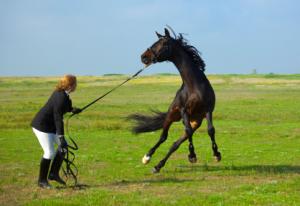|
By Kathleen A. Reagan, Esq.
As you might expect, we get lots of questions submitted that range across the board concerning horses.
Yet, out of this broad range, one topic emerges as the overwhelming issue confronting most horse owners and riders, and that is, how to properly manage and discipline horse misbehavior.
Judging by what is being asked, we've formed an opinion on this topic which doesn't speak so well of our current generation, namely, that the vast majority of Baby Boomer horse owners stink at discipline.

|
Out-of-Control Horse
Horse misbehavior can be very dangerous to humans and other horses alike.
The horse that doesn't listen can start a cascade of panic in other horses that risks the safety of all others around.
Horse owners and riders MUST earn their horse's respect and be able to control them.
|
|
Though, given what's out there in society, this isn't exactly a shocking or new observation.
I can draw a parallel here between parents who want to befriend their kids and horse owners who find it distasteful to learn how to properly discipline horse misbehavior.
In both instances, the abdication of authority by the parent or horse owner allows them to avoid effortful or disturbing questions about how THEY deal with defiant behavior.
It also saves the parent or horse owner from the initial hard work necessary to enforce the objective in mind.
This is a win from the Boomer's point of view, and in the short term, the horse and child alike rejoice in happy freedom from restraint.
HOWEVER, we all know of too many spoiled horses and children not to know what we're talking about on this issue.
(Dear Reader, on this point, please don't feign ignorance.)
Like a bad loan, the benefits of this approach are short, but the interest and penalties that must ultimately be paid are long.
More specifically for our focus, there are significant safety risks with horses that don't view their owner/rider as the leader.
Keep in mind that if horses are not disciplined to behave properly around humans, that they become a serious danger not only to themselves, but also to all other horses and humans in their vicinity.
Horses are easily spooked, and what is rebellion in one horse can instantly spread to fear and flight in the rest.
Worse, as bad behavior is rewarded over time with a sense of victory by the horse, he becomes more and more convinced that HE is the boss and will fight harder and harder to maintain his leadership role.
Because horses are biologically impelled to find or be a leader in the herd, this is the wrong side of the equation for humans.
Only by the human being a leader to the horse can proper relations be maintained.
This is for the horse's benefit as well as the human's (do you know of any horses that are smarter than humans?).
Consider the fate of a horse that is a confirmed human-killer: a long trailer ride to Mexico or Canada to a meat packing plant would be only one of a series of bad fates that await such an animal.
I know that rescue operations might take such an animal, but even they have a responsibility for safety to staff and visitors that would tie their hands in regards to such a horse.
I'm willing to take the heat for making this point plainly:
HORSE OWNERSHIP IS AN EXERCISE IN RESPONSIBILITY, AND LIVING UP TO THAT RESPONSIBILITY MEANS ACTING AS THE LEADER IN THE ROLE OF DISCIPLINE.
So, reach out, get help, and don't be afraid to act if this pertains to you.
YOU MUST BE THE LEADER in a relationship with your horse and any horse you ride or safety is compromised for you and all around.
If there is any doubt in your mind, get the proper training to learn how to become the alpha of your personal herd.
The details are your decision, but the consequences will be borne by your horse as well as your family and friends.
Happy Disciplined Trails!
Kathleen A. Reagan, Esq. is an equine attorney practicing in Braintree, MA, available at www.kathleenreaganlaw.com, has developed a course in equine law at www.concordlawschool.com, and is co-founder and Vice President of QueryHorse, the largest horse information resource on the Internet.
Back to Article Index
|